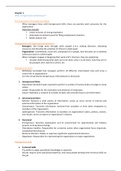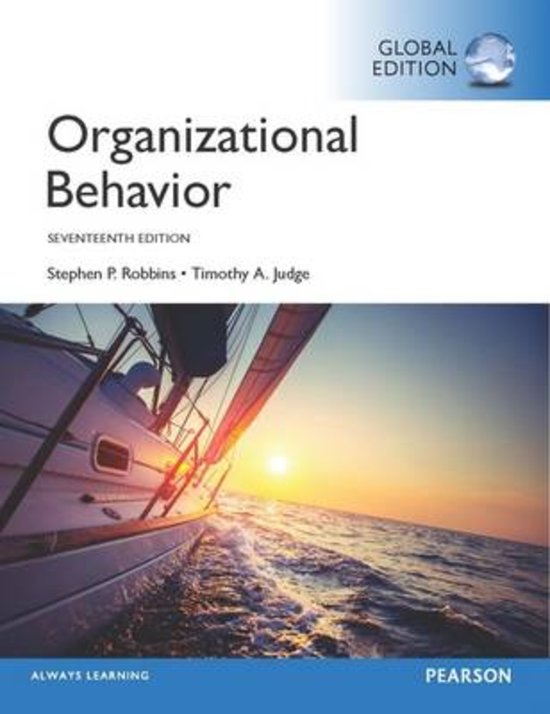Chapter 1
What is Organisational Behaviour?
The Importance of Interpersonal Skills
- When managers have solid interpersonal skills, there are positive work outcomes for the
organisation
- Outcomes include:
• Lower turnover of strong employees
• Improved recruitment pools for filling employment positions
• Better bottom line
Management and Organisational Behaviour
- Managers: Get things done through other people b.m.o making decisions, allocating
resources and directing the activities of others to attain goals
- Organisation: Coordinated, social unit, composed of 2+ people, that functions on a relatively
continuous basis to achieve goals
- When managers engage in designing their work unit’s structure, they are organising
• Includes determining what tasks are to be done, who is to do them, how they are to
be grouped, who reports to whom, etc.
Management Roles
- Mintzberg concluded that managers perform 10 different, interrelated roles and serve a
critical role in organisations
- 10 roles are primarily interpersonal, informational or decisional
1. Interpersonal Roles
- Figurehead: Symbolic head; required to perform a number of routine duties of a legal or social
nature
- Leader: Responsible for the motivation and direction of employees
- Liaison: Maintains a network of outside contacts who provide favours and information
2. Informational Roles
- Monitor: Receives a wide variety of information; serves as nerve centre of internal and
external information of the organisation
- Disseminator: Transmits information received from outsiders or from other employees to
members of the organisation
- Spokesperson: Transmits information to outsiders on organisation’s plans, policies, actions,
and results; serves as expert on organisation’s industry
3. Decisional
- Entrepreneur: Searches organisation and its environment for opportunities and initiates
projects to bring about change
- Disturbance handler: Responsible for corrective action when organisation faces important,
unexpected disturbances
- Resource allocator: Makes or approves significant organisational decisions
- Negotiator: Responsible for representing the organisation at major negotiations
Management Skills
1. Technical Skills
- The ability to apply specialised knowledge or expertise
- All jobs require some specialised expertise, and many people develop their technical skills on
the job
, 2. Human Skills
- The ability to understand, communicate with, motivate and support other people, both
individually and in groups
- Many may be technically proficient, but poor listeners, unable to understand the needs of
others, or weak at managing conflicts
3. Conceptual Skills
- Managers must have the mental ability to analyse and diagnose complex situations
- Decision making requires managers to identify problems, develop alternative solutions to
correct those problems, evaluate those solutions, and select the best one
Effective vs. Successful Managerial Activities
- Fred Luthans and his associates found that all managers engage in 4 managerial activities
• Traditional management: Decision making, planning and controlling
• Communication: Exchanging routine information and processing paperwork
• Human Resource Management: Motivating, disciplining, managing conflict, staffing,
and training
• Networking: Socialising, politicking and interacting with outsiders
- Organisational Behaviour: A field of study that investigates the impact individuals, groups,
and structure have on behaviour within organisations, for the purpose of applying such
knowledge toward improving an organisation’s effectiveness
Complementing Intuition with Systematic Study
- Systematic study: Looking at relationships, attempting to attribute causes and effects, and
basing our conclusions on scientific evidence
• The systematic study of OB has come closer to finding ways to predict the behaviour
of individuals and groups through an understanding of the situation and composition
of people
- Evidence-based management: Complements systematic study by basing managerial decisions
on the best available scientific evidence
- Systematic Study and EBM add to intuition (gut feeling) about what makes others do what
they do
• If all decisions were made with our gut, likely working with incomplete information
Big Data
- The extensive use of statistical compilation and analysis
- Online retailers began to track and act upon information about customer preferences that
was uniquely available through the Internet shopping experience
- Enables them to create more targeted marketing strategies
- Reasons for data analytics:
• Predicting any event (Book purchase to malfunctions)
• Detecting how much risk is incurred at any time (fire risk or loan default)
• Preventing large or small catastrophes (plane crash to overstock)
- Mostly used by technology companies (Google) who rely on advertising dollars for revenue
and thus need to predict user behaviour
- The use of Big Data for understanding, helping, and managing people is new but holds promise
- Big Data has implications for correcting management assumptions and increasing positive
performance outcomes
- Increasingly applied towards making effective decisions and managing HR
- As technological capabilities for handling Big Data have increased, so have issues of privacy
- Use evidence as much as possible to inform your intuition and experience
,Disciplines that Contribute to the OB Field
- OB is an applied behavioural science built on contributions from a number of behavioural
disciplines
1. Psychology 3. Sociology
- Seeks to measure, explain and - Studies people in relation to their
sometimes change the behaviour of social environment or culture
humans and other animals - Sociologists have contributed to OB
- The area of study offers insights into through their study of group
areas such as learning, training, behaviours in organisations
decision making and employee - Most NB, sociologists have studied
selection organisational culture, formal
organisation theory and structure,
2. Social Psychology organisational technology,
- Blends concepts from both psychology communications, power and conflict
and sociology to focus on people’s
influence on one another 4. Anthropology
- Change is a major study area – how to - The study of societies to learn about
implement it and how to reduce human beings and their activities
barriers to its acceptance - Anthropologists’ work on cultures and
- Also contribute to measuring, environments has helped us
understanding, and changing understand differences in
attitudes, identifying communication fundamental values, attitudes and
patterns, and building trust behaviour among people in different
- Made NB contributions to our study of countries and within different
group behaviour, power and conflict organisations
Few Absolutes in OB
- There are few, if any, simple and universal principles that explain organisational behaviour
- Contingency variables: Situational factors; Variables that moderate the relationship between
two or more variables
- When making decisions, you must always take into account the situational factors that can
change the relationship between two variables
- Every situation has the potential to have unforeseen or known factors that can change rapidly
, Challenges and Opportunities for OB
1. Economic Pressures
- When times are bad, managers are on the front lines with employees who are asked to make
do with less, who worry about their futures, and who sometimes must be fired
- The difference between good and bad management can be the difference between profit and
loss or business survival or failure
- In good times, understanding how to reward, satisfy and retain employees is at a premium
2. Continuing Globalisation
- Organisations are no longer constrained by national borders
- The world has become a global village and, in the process, the manager’s job has changed
- Effective managers will anticipate and adapt their approaches to the global issues
a) Increased foreign assignments
- When transferred to an operating division or subsidiary in another country, have to
manage a workforce very different in needs, aspirations and attitudes from those you are
used to
- Need to understand as much as possible about the new location’s culture and workforce
b) Working with people from different cultures
- Bosses, peers and other employees born and raised in different cultures
- What motivates you may not motivate them, or your communication style may be
interpreted as threatening and uncomfortable
- To work effectively, you need to understand how their culture and background have
shaped them and how to adapt your management style to fit any differences
c) Overseeing movement of jobs to countries with low-cost labour
- Difficult for managers in advanced nations to compete against firms that reply on workers
from developing countries where labour is available for cheap
d) Adapting to different cultural and regulatory norms
- Managers need to know the cultural norms of the workplace in each country where they
conduct business
- There will be country and local regulations to consider
- Managers of subsidiaries abroad need to be aware of the unique financial and legal
regulations
- Understand how to operate in another country in terms of respect
• E.g. DON’T thumbs-up someone in India = swearing, cursing them
3. Workforce Demographics
- Investigate what factors lead employees to make various choices and how their experiences
affect their perceptions of their workplaces, helping us predict organizational outcomes
4. Workforce Diversity
- Concept that organisations are becoming more heterogeneous i.t.o gender, age, race,
ethnicity, sexual orientation, and other characteristics
5. Customer Service
- Service employees share substantial interaction with an organisation’s customers
- OB can help managers increase the success of these interactions by showing how employee
attitudes and behaviour influence customer satisfaction
- Employees fail to please customers = failed organisation
- Management needs to create a customer-responsive culture





